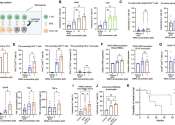Last update:
Immunology news
HIV & AIDS
New study uncovers why boys born to mothers with HIV are at greater risk of health problems and death in infancy
Researchers have found that children of women with HIV infection have an increased risk of immune abnormalities following exposure to maternal HIV viremia, immune dysfunction, and co-infections during pregnancy. The research ...
17 hours ago
0
1
Diseases, Conditions, Syndromes
Harnessing B cells could fight cancer or autoimmune diseases by targeting mitochondrial metabolism
White cells called regulatory B cells could be harnessed to fight cancers and to treat autoimmune diseases by either increasing or decreasing their function, as indicated by a new research.
18 hours ago
0
8
Study finds lower relapse risk in triple-negative breast cancer with high immune cell levels
Women with triple-negative breast cancer, and high levels of immune cells in the tumors, have a lower relapse risk after surgery, even without chemotherapy, according to a recent study published in JAMA.
12 hours ago
0
5

Researchers probe immune microenvironment to prevent pediatric liver transplant rejection
Children with liver transplants must take immunosuppressant medications for life. To maintain tolerance of the transplanted liver, doctors treat transplant rejection and conduct ongoing maintenance immunosuppression by increasing ...
18 hours ago
0
29

Targeted therapies outperform hundreds of other drugs in 'priming' lung cancer cells for destruction
Through millions of years of evolutionary refinement, the human body has developed a sophisticated surveillance mechanism—the immune system. This intricate network is constantly scanning the body for invaders such as bacteria, ...
15 hours ago
0
0

New trial shows immunotherapy post-surgery improves overall survival for kidney cancer
For the first time in fifty years, results from a Phase 3 randomized, placebo-controlled trial have shown an overall survival benefit from an adjuvant therapy in patients with kidney cancer.
11 hours ago
0
1

FDA adds Fasenra indication for severe asthma in children
The U.S. Food and Drug Administration has approved an additional indication for AstraZeneca's Fasenra (benralizumab) as an add-on maintenance treatment for patients aged 6 to 11 years with severe asthma and an eosinophilic ...
17 hours ago
0
0

Antibiotics reveal a new way to fight cancer
Cancer cells grow and spread by hiding from the body's immune system. Immunotherapy allows the immune system to find and attack hidden cancer cells, helping cancer patients live longer lives. However, many patients get little ...
Apr 16, 2024
0
45

New insights could unlock immunotherapy for rare, deadly eye cancer
New research from the University of Pittsburgh explains why metastatic uveal melanoma is resistant to conventional immunotherapies and how adoptive therapy, which involves growing a patient's T cells outside the body before ...
Apr 16, 2024
0
9

Research uncovers new reasons to target neutrophils for tuberculosis therapy
Tuberculosis is the biggest infectious killer in the world, causing 1.2 million deaths every year. In common with other pneumonia types, tuberculosis can destroy the human lung as a result of excessive inflammation.
Apr 16, 2024
0
21

Asthma in children: Researchers envision novel drug to reduce the risk of the disease
Scientists have reached a milestone in the research of childhood asthma. For the first time, they have clarified how a certain genetic defect in children initially leads to frequent infections and later to asthma. The study, ...
Apr 16, 2024
0
14

Novel therapeutic bispecific antibodies for B-cell lymphoma
A new research paper was published in Oncotarget entitled, "Novel therapeutic bispecific antibodies for B-cell lymphoma targeting IgM and other antigens on the B-cell surface."
Apr 16, 2024
0
0

Specific nasal cells found to protect against COVID-19 in children
Important differences in how the nasal cells of young and elderly people respond to the SARS-CoV-2 virus, could explain why children typically experience milder COVID-19 symptoms, finds a new study led by researchers at UCL ...
Apr 15, 2024
0
52

Planning safe summer camp fun for kids with allergies and asthma
Preparing a kid for summer camp is already a daunting task, and it's even more complicated if your child has allergies or asthma, experts say.
Apr 15, 2024
0
0

Penicillin allergy can be delabeled by nonallergy providers
Direct oral penicillin challenges (DPCs) can be delivered to patients with penicillin allergy labels (PALs) by nonallergy health care professionals (HCPs), according to a study published in the March issue of the Journal ...
Apr 14, 2024
0
0

New insights on B cells: Researchers explore building better antibodies and curbing autoimmune diseases
Four new studies led by Harvard Medical School researchers at Boston Children's Hospital reveal details about how B cells in the immune system churn out antibodies that become increasingly potent and specific after we're ...
Apr 12, 2024
0
36

Metformin may help the immune system better identify breast cancer cells
Metformin is a widely prescribed drug for managing type 2 diabetes. In recent years, indications of its potential anticancer properties have emerged in research. A study conducted at the University of Helsinki has found that ...
Apr 12, 2024
0
63

New study probes macrophages' role in developing pulmonary fibrosis
Scientists have long known that white blood cells called macrophages accumulate in the lungs of people suffering from pulmonary fibrosis. What role macrophages play in developing the often fatal lung disease is less clear.
Apr 12, 2024
0
17

Study suggests staying current with COVID-19 vaccinations helps combat emerging variants
New research using live SARS-CoV-2 virus reveals an updated vaccine provides a strong immune response against previous strains and emerging variants.
Apr 12, 2024
0
47

Successful murine model of dermatomyositis reveals underlying immune system involvement
Some diseases involve autoimmune reactions when the body begins to attack its own cells and proteins. The biological mechanisms underlying these diseases are often unknown, making treatment challenging. Now, a group at TMDU ...
Apr 11, 2024
0
11




















